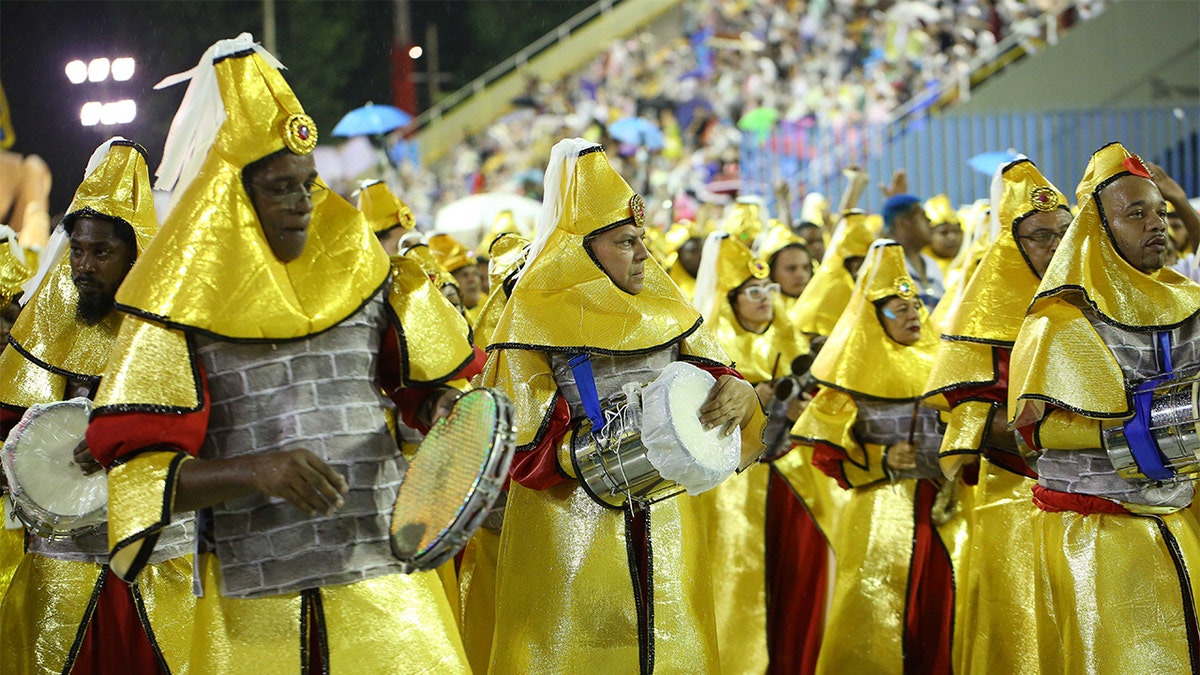Fox News Flash top headlines for Feb. 22
Fox News Flash top headlines are here. Check out what's clicking on Foxnews.com.
Sexy costumes, bands, festivities, wild parades - and murky water.
As the official Carnival celebrations kick off in the Brazilian city of Rio Saturday, potable water has become a valuable commodity, especially in the peak of summer when temperatures hit 120 degrees F.
Since the beginning of January, sinks and showers have provided only cloudy water that smells like clay. The problem has not been resolved and with the arrival of 10 million tourists next week, the situation likely will get worse.

People of the Samba School Academicos da Rocinha perform during the Rio Carnival, in Rio de Janeiro, Brazil, on February 21, 2020 (Photo by Gilson Borba/NurPhoto via Getty Images)
BRAZILIAN SENATOR SHOT DURING STRIKE BY MILITARY POLICE
Rio’s public water company, called CEDAE (State Company of water and sewage) apologized for what happened and blamed the supposedly inoffensive and safe organic compound "geosmin." It multiplies in nutrient-rich aquatic environments, such as springs that receive untreated sewage, but is atoxic. Some disagree.
“If the water is not odorless, colorless and tasteless is not safe,” said biologist Ana Passos.
On Feb. 3, the crisis hit a new low, and the whole treatment center of Guandu was closed due to the presence of a detergent in massive quantities. It's not clear where the compound came from, but specialists said the source is probably industries outside Rio and blamed heavy rain.

People of the School Unidos da Ponte perform during the Rio Carnival, in Rio de Janeiro, Brazil, on February 21, 2020 (Photo by Gilson Borba/NurPhoto via Getty Images)
To stop the contamination, treatment was started using activated charcoal at Guandu. For experts, however, the solution is temporary and does not solve the problem.
“The city discharges sewage directly into the tributaries of the Guandu River. The quality of the water that reaches the station is very poor. The station is overloaded,” said Márcia Dezzoti, a specialist from Universidade Federal do Rio de Janeiro (UFRJ).
'HISTORIC' CHRISTIAN EVENT BRINGS TOGETHER 140,000 YOUTH - AND BRAZIL'S PRESIDENT
For tourists, it was never safe to drink from the sink in Rio, but even filtered water is not potable anymore.
The crisis, however, hasn’t scared international visitors, according to City Hall. Hotel occupancy is up to 90 percent. Argentinians and Americans lead the population of foreign tourists for Carnival. Tourism representatives are nonetheless worried about the lack of information provided to those who come.

People of the Samba School Academicos de Vigario geral perform during the Rio Carnival, in Rio de Janeiro, Brazil, on February 21, 2020 (Photo by Gilson Borba/NurPhoto via Getty Images)
“People get to the hotel and don’t know anything. We have to do the information, a public information that was supposed to be available, because it is dangerous. It’s summer, people will be in contact with the water, not only drinking, but, for example, washing vegetables, having a shower, etc.,” said Igor Machado, an employer of Discovery Hostel.
The Tourism Office of Rio (RioTur) declined to comment. The Health Surveillance Agency (Vigilância Sanitária) is informing tourists and residents through campaigns around the city and in social media. But, like Karl Mariano, who arrived from Holland with two Brazilian friends, the info didn’t reach most of them.
“I had no idea the water was contaminated, people even told me it wasn’t safe to have a shower," he said. "I was never informed, nothing. I will enjoy the party, but will buy bottled water."
Residents and tourists are in a race for mineral water in the city. Bottles disappear in markets in hours and prices are spiking all over town. Some families are even having to choose between water or food.
Though the ongoing crisis is having a substantial impact on the daily lives of Rio's residents, it was less than surprising that hundreds of revelers are using it to inspire creative costumes in the pre-Carnival festivities. Resident Maíra Amorim was one of those, carrying a bottle of water as a valuable asset.
CLICK HERE FOR THE FOX NEWS APP
“It’s an absurd situation,” she said. “But we can’t lose our Carnival spirit of making criticism with a sense of humor."









































